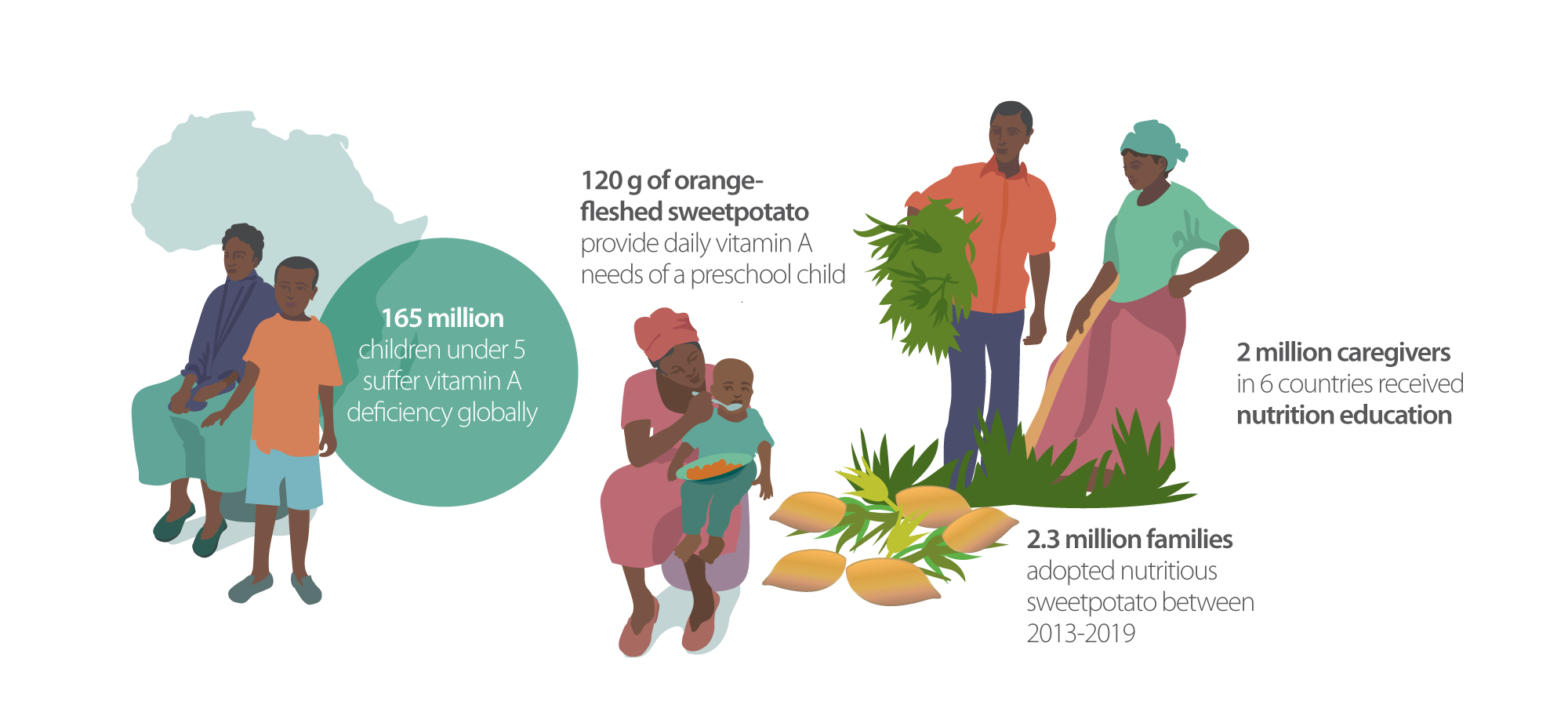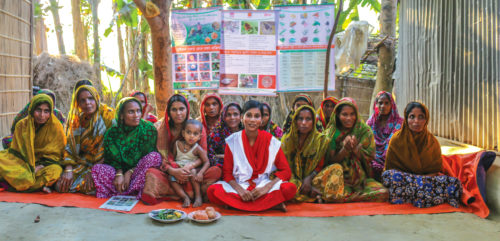
Sweet resilience
Sweetpotato helps communities bounce back from humanitarian crises
In March 2019, Cyclone Idai barreled across central Mozambique whipping winds at 170 km per hour and unleashing torrential rains that wiped out 700,000 hectares of crops, left more than 1,000 dead, and caused USD 2 billion of damage in Malawi, Mozambique and Zimbabwe.
Within weeks of that disaster, the International Potato Center (CIP) partnered with the International Committee of the Red Cross to distribute 40 metric tons of sweetpotato planting material in the Mozambican provinces of Sofala and Manica, to help 7,500 smallholder farmers get back on their feet quickly and increase the availability of a nutritious, fast-growing food crop.
“There is no other crop as good as sweetpotato for post emergency recovery,” said Maria Andrade, CIP country manager in Mozambique.
Andrade explained that the planting material distributed was locally adapted orange-fleshed sweetpotato, just 120 grams of which provide the vitamin A needs of a five-year-old child. This is an invaluable trait in Mozambique, where 69% of children suffer vitamin A deficiency, which compromises their immune systems and causes some to go blind. Within two months of planting, families were able to begin eating vitamin-rich sweetpotato leaves, and within three months, they were harvesting nutritious, calorie-packed sweetpotatoes to eat and sell.
Andrade’s team liaised with local authorities to ensure that an additional 20 metric tons of vines were planted and multiplied for distribution two months later, when floods receded and lowlands could be farmed again, which benefited another 4,000 resource-poor farming families. They also worked with specialized farmers known as vine multipliers—who grow sweetpotato vines to produce cuttings for sale—to restart the planting material supply chain.
Building on success
Farmers in the provinces pummeled by Cyclone Idai were on the road to recovery in record time because CIP had been working there since 2014 through a project called “Scaling up sweetpotato through agriculture and nutrition” (SUSTAIN). That initiative trained more than 90 vine multipliers and promoted the crop widely in Mozambique.
As part of SUSTAIN, nearly 300,000 Mozambican farming families with children under five received planting material for nutritious sweetpotato and training on how to grow the crop. At the same time, local government and NGO partners provided gender-responsive nutrition education—with an emphasis on orange-fleshed sweetpotato— to more than 200,000 caregivers between 2013 and 2019.
When farmers harvested the first post-cyclone sweetpotatoes, there was a strong market ready to buy them, thanks to years of promotional campaigns, agronomic training, cooking classes and the use of orange-fleshed sweetpotato puree by bakeries and other food processors. The promotion and education resulted in a growing number of Mozambicans who cultivate and consume orange-fleshed sweetpotato—a crop that was rare in the country just 15 years earlier.
“I can guarantee that if you ask people here about orange-fleshed sweetpotato, 90% are familiar with it and they know it is good for children,” Andrade said.
That awareness has spread from farms and markets to government offices. Orange-flesh sweetpotato is now a priority crop promoted by federal ministries and provincial directorates of agriculture and health, and a range of civil society organizations. Such buy-in reflects growing recognition that a combination of planting material distribution, agricultural training, nutrition education, and market building can improve food security, vitamin A uptake and incomes.
International impacts
SUSTAIN achieved impressive results in Bangladesh, Kenya, Malawi, Rwanda, Tanzania and Mozambique, reaching 2.3 million households with children under five with nutritious sweetpotato and 2 million people with nutrition education.
This investment has not only reduced the risk of hunger and vitamin A deficiency in vulnerable communities, it has also boosted their resilience.
In the years ahead, unpredictable climate-induced and other disasters are bound to threaten developing countries. In those situations, sweetpotato is uniquely positioned to provide quick, affordable food, nutrition, and long-term sustainability for resource-poor farming families around the world.




